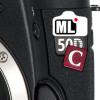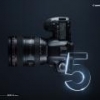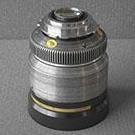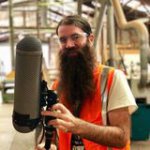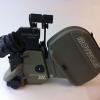
jax_rox
-
Posts
510 -
Joined
-
Last visited
Reputation Activity
-
 jax_rox reacted to MattGrum in Lenses should have megapixel ratings
jax_rox reacted to MattGrum in Lenses should have megapixel ratings
No they really shouldn't. A lens does not "resolve 6MP".
A lens renders a certain spatial frequency at a certain contrast ratio. It might take detail at 20 line pairs per millimeter and produce 70% contrast, detail at 50 line pairs per millimeter results in 30% contrast etc. This relationship is captured by the modulation transfer function (MTF), a quantity which varies according to the distance from the image centre, and the direction you measure in (sagital vs tangential). Manufacturers already publish MTF charts for their lenses, which is the equivalent of what you're suggesting, only much more meaningful. There are some differences in how these charts are computed (e.g. whether diffraction is included or not) so they're not always directly comparable, but they aren't anywhere near as misleading as trying to attach a single "megapixel" rating to lenses.
The other reason stating "this lens resolves 6MP" is meaningless is that the important thing in determining how you images will look is not the lens MTF itself, but the system MTF. The system MTF is the product of MTFs of each part, the lens the filter stack and the sensor (and image processing to an extent). Because it's a mathematical product (a lens delivering 80% contrast combined with an AA filter that delivers 95% contrast results in 76% contrast (0.8 x 0.95 x 100)) you can improve the system MTF by improving the MTF of any component in the system. Hence you "6MP" lens will give you more resolution on a 24MP body than on a 6MP body.
It's exactly this thinking that leads people to declare that there's no reason to have a 50MP sensor as there are no 50MP lenses in existence. Even the kit lens in your example produces some contrast in the centre of the image at 50MP.
-
 jax_rox got a reaction from Julian in Sony A7R II looks to feature 9K sensor / 56MP
jax_rox got a reaction from Julian in Sony A7R II looks to feature 9K sensor / 56MP
I don't really understand why - these cameras are still first and foremost photo cameras, perhaps with the exception of the A7s.
Yes - in the future, when 4k has become the new 1080p - i.e. the standard (it hasn't yet) but not in the immediate future.
-
 jax_rox got a reaction from Axel in On Adobe, Apple, BlackMagic and 'being careful' ...
jax_rox got a reaction from Axel in On Adobe, Apple, BlackMagic and 'being careful' ...
Perhaps you're right - but aren't those who are doing this, doing so because they are not in a position at this current point in time to be able to make bigger budget films? Isn't the end goal to be able to work with budgets that allow you to do what you want and need to be able to effectively tell the stories you want to?
If so, shouldn't you at least be attempting to make your film in a similar way, and to at least attempt to get to the same kind of standard - that is, if someone one day sees enough potential in you to give you a bigger budget, don't you want to be educated enough, and understand why exactly you're going to have to spend time micing up actors and hiring sound guys, rather than suggesting that you 'mount a mic on the camera and get close enough - I've done it heaps of times before and the audio is perfectly usable'?
Sure - if you only ever want to make small films, then fine. I was simply under the impression that people were making tiny budget films out of necessity, rather than because that's what they want to do.
-
 jax_rox got a reaction from zetty in On Adobe, Apple, BlackMagic and 'being careful' ...
jax_rox got a reaction from zetty in On Adobe, Apple, BlackMagic and 'being careful' ...
Yes, and then had many thousands spent on it for all sorts of post processes to actually get it to a distributable level, and then in the actual distribution.
Look at the numbers:
http://www.indiewire.com/article/sundance-2015-infographic-most-festival-films-will-land-distribution-deals-20150116
Roughly 2300 films submitted to Sundance. Of that, maybe 100 get some sort of distribution deal. The average budget is nearly $2mil - commercially viable films that just need someone to distribute them.
How many of those films that were picked up had sound from a mic that was mounted on camera? How many have crews that are in the 1-2 people range? I'm going to take a guess and say none.
I can't recall the last film that was made for <$10k with a crew of one that ended up getting picked up for mass distribution - can you? Perhaps Monsters, but then that was ~$25k + 10 times that or so to get it to a distributable level, and then distribute it...
Even Like Crazy had a $200,000 budget and a pretty large crew, despite being shot on a 7D and being a really rather simple, non-extravagant love story.
I'm happy to be proven wrong - I guess I just don't really understand the whole playing the odds of doing it all yourself - you've likely got more chance of winning the lottery; at least someone wins the lottery each week.
-
 jax_rox got a reaction from zetty in On Adobe, Apple, BlackMagic and 'being careful' ...
jax_rox got a reaction from zetty in On Adobe, Apple, BlackMagic and 'being careful' ...
It all comes down to your goals. What if you want to make a feature? Do you want to make a feature that is able to commercially distributed, especially without needing to convince a studio to spend millions 'fixing' everything for you (especially the sound mix), or do you just want to make something that you can show to some friends, burn a few DVDs and attempt to drum up some interest online to be able to sell DVDs?
Do you want to have a better chance of making your money back quicker? Or do you want to take the risk that you may never make your money back?
It sounds like you've placed a lot of imposition on yourself. You don't want to record dual system sound, despite the fact that for ~$200 you can have a recorder and boom pole that you can have a friend hold and instantly you'll have better sound than simply sitting a mic on the camera and hoping you'll get close enough. Plug the lav into the recorder and hide the recorder in the actors clothes - makeshift wireless lav.
I can tell you that the best Directors consider sound and sound design right from the start, rather than considering it simply a 'pain in the ass'.
I don't look down upon you for doing what you feel you need to do. I just think you've unfarily impositioned yourself and by doing so, you're severely hampering your chances at major success. Now, maybe you don't want major success, and that's fine too.
All I know is I shoot a lot of different projects - and I know many filmmakers I've worked with who are trying to get noticed would rather spent $5k-$10k making a really damn good short with a simple but excellent story, great production values, a good colour grade and proper sound design and mix - send it to festivals and eventually the internet and try and sell their feature script after that... Rather than attempting to make $5k-$10k stretch for an entire feature - as they know that the feature will be mediocre at best, and the production won't be of a level that they're happy having out there as their calling card.
-
 jax_rox got a reaction from studiodc in On Adobe, Apple, BlackMagic and 'being careful' ...
jax_rox got a reaction from studiodc in On Adobe, Apple, BlackMagic and 'being careful' ...
If you want to make a commercially viable film - of course you have to be held up to the same standards. Have you ever been to a movie and though 'well that looked and sounded like utter sh*t, but hey - they didn't have the same budget, so I guess it's great that they tried'?
Those who spend years honing their craft are able to make professional quality projects on much smaller budgets than you would think. You've chosen to be a jack of all trades, rather than hone in on one specific skillset - you could do so and be able to compete with the 'big boys' or even develop a network of people who you can call upon to help you with your no/lo budget projects.
Your argument strikes me as being this: I'm a DIY builder. I love to build stuff in my spare time. I particularly like to build chairs that hopefully people will be able to sit on. Here's the thing though - there's builders out there who have done apprenticeships and been working for a very long time and they make these amazing chairs that everyone loves and are perfectly sturdy enough to sit on. Why am I expected to be able to make chairs that are good enough, and sturdy enough, for people to be able to sit on, when I haven't spent years working to be a builder??
Why would a sound engineer want the ability to change the colour of the film in their software? I'm sure as a Director, the last thing you would want is the dialogue mixer accidentally screwing with the colour of your film, or your colourist accidentally changing the sound mix..
Imagine all the potential issues if everyone had to work from one project file on one piece of software...
I don't understand - are you saying that software companies should make one 'post software to rule them all' in addition to all their other seperate, job-specific, stand-alone software..?
Of course it does - the only thing it doesn't necessarily need to be able to do is apply 'funky' looks via some sort of 'filter bank' a la Instagram. AVID actually has quite powerful Colour Correction tools.
In terms of being 'lied to' - the problem lies in the fact that companies like Apple, Adobe, Blackmagic - in general they're targetting the consumers who have throwaway cash to spend on what can often be boiled down to essentially a hobby - and so of course they're going to try and wring out as much cash as possible. It's like the gimmicks they use to sell TVs et al. Professionals see right through that because they have a much deeper knowledge and understanding, whereas the consumers who have this as a hobby are continually looking for that something 'better' that's going to make their footage and films look and sound as good as someone who's spent 25 years honing their skills, as quickly and easily as the push of a button.
-
 jax_rox got a reaction from mtheory in On Adobe, Apple, BlackMagic and 'being careful' ...
jax_rox got a reaction from mtheory in On Adobe, Apple, BlackMagic and 'being careful' ...
If you want to make a commercially viable film - of course you have to be held up to the same standards. Have you ever been to a movie and though 'well that looked and sounded like utter sh*t, but hey - they didn't have the same budget, so I guess it's great that they tried'?
Those who spend years honing their craft are able to make professional quality projects on much smaller budgets than you would think. You've chosen to be a jack of all trades, rather than hone in on one specific skillset - you could do so and be able to compete with the 'big boys' or even develop a network of people who you can call upon to help you with your no/lo budget projects.
Your argument strikes me as being this: I'm a DIY builder. I love to build stuff in my spare time. I particularly like to build chairs that hopefully people will be able to sit on. Here's the thing though - there's builders out there who have done apprenticeships and been working for a very long time and they make these amazing chairs that everyone loves and are perfectly sturdy enough to sit on. Why am I expected to be able to make chairs that are good enough, and sturdy enough, for people to be able to sit on, when I haven't spent years working to be a builder??
Why would a sound engineer want the ability to change the colour of the film in their software? I'm sure as a Director, the last thing you would want is the dialogue mixer accidentally screwing with the colour of your film, or your colourist accidentally changing the sound mix..
Imagine all the potential issues if everyone had to work from one project file on one piece of software...
I don't understand - are you saying that software companies should make one 'post software to rule them all' in addition to all their other seperate, job-specific, stand-alone software..?
Of course it does - the only thing it doesn't necessarily need to be able to do is apply 'funky' looks via some sort of 'filter bank' a la Instagram. AVID actually has quite powerful Colour Correction tools.
In terms of being 'lied to' - the problem lies in the fact that companies like Apple, Adobe, Blackmagic - in general they're targetting the consumers who have throwaway cash to spend on what can often be boiled down to essentially a hobby - and so of course they're going to try and wring out as much cash as possible. It's like the gimmicks they use to sell TVs et al. Professionals see right through that because they have a much deeper knowledge and understanding, whereas the consumers who have this as a hobby are continually looking for that something 'better' that's going to make their footage and films look and sound as good as someone who's spent 25 years honing their skills, as quickly and easily as the push of a button.
-
 jax_rox got a reaction from Axel in On Adobe, Apple, BlackMagic and 'being careful' ...
jax_rox got a reaction from Axel in On Adobe, Apple, BlackMagic and 'being careful' ...
If you want to make a commercially viable film - of course you have to be held up to the same standards. Have you ever been to a movie and though 'well that looked and sounded like utter sh*t, but hey - they didn't have the same budget, so I guess it's great that they tried'?
Those who spend years honing their craft are able to make professional quality projects on much smaller budgets than you would think. You've chosen to be a jack of all trades, rather than hone in on one specific skillset - you could do so and be able to compete with the 'big boys' or even develop a network of people who you can call upon to help you with your no/lo budget projects.
Your argument strikes me as being this: I'm a DIY builder. I love to build stuff in my spare time. I particularly like to build chairs that hopefully people will be able to sit on. Here's the thing though - there's builders out there who have done apprenticeships and been working for a very long time and they make these amazing chairs that everyone loves and are perfectly sturdy enough to sit on. Why am I expected to be able to make chairs that are good enough, and sturdy enough, for people to be able to sit on, when I haven't spent years working to be a builder??
Why would a sound engineer want the ability to change the colour of the film in their software? I'm sure as a Director, the last thing you would want is the dialogue mixer accidentally screwing with the colour of your film, or your colourist accidentally changing the sound mix..
Imagine all the potential issues if everyone had to work from one project file on one piece of software...
I don't understand - are you saying that software companies should make one 'post software to rule them all' in addition to all their other seperate, job-specific, stand-alone software..?
Of course it does - the only thing it doesn't necessarily need to be able to do is apply 'funky' looks via some sort of 'filter bank' a la Instagram. AVID actually has quite powerful Colour Correction tools.
In terms of being 'lied to' - the problem lies in the fact that companies like Apple, Adobe, Blackmagic - in general they're targetting the consumers who have throwaway cash to spend on what can often be boiled down to essentially a hobby - and so of course they're going to try and wring out as much cash as possible. It's like the gimmicks they use to sell TVs et al. Professionals see right through that because they have a much deeper knowledge and understanding, whereas the consumers who have this as a hobby are continually looking for that something 'better' that's going to make their footage and films look and sound as good as someone who's spent 25 years honing their skills, as quickly and easily as the push of a button.
-
 jax_rox got a reaction from richg101 in A7S no successor at NAB 2015 ?
jax_rox got a reaction from richg101 in A7S no successor at NAB 2015 ?
Seems a lot of people here are continually trying to better the camera they buy - for some reason thinking that the better the camera they have, the better the footage will be.
You should work on bettering yourself - your operating, your lighting skills, your framing, your creative eye. Work on telling better stories through the lens, and then it won't matter what camera you shoot it on
-
 jax_rox got a reaction from IronFilm in A7S no successor at NAB 2015 ?
jax_rox got a reaction from IronFilm in A7S no successor at NAB 2015 ?
For me - I would simply be happy if my A7s had IBIS and real weather sealing.
Internal 4k is neither here nor there - the fact that it can do 4k is good enough (and I think people make a much bigger deal about internal 4k than it really is - yes, I know it's handy to have and all the rest of it, but a camera that does great 1080p and is also able to do 4k is really enough for most occasions, especially with 4k recorders coming down in price).
I'd rather 10-bit HD than 4k internal - if they brought out an A7s with IBIS, weather sealing and 10-bit 1080p in XAVC, then I would upgrade (assuming it was a similar price to when it was initially released)
Sony just upped the RRP on the A7s not long ago as well (at least in Australia) - which would seem pretty strange if you had a successor coming soon.
-
 jax_rox got a reaction from leeys in A7S no successor at NAB 2015 ?
jax_rox got a reaction from leeys in A7S no successor at NAB 2015 ?
I think it's handy - not 'huge'.
I've shot a lot of night stuff on Alexa, even while owning an A7s. It's super handy to have a little camera that has superb ISO performance and allows you to steal shots or whatever. Yes, it's freedom etc etc.
But I've never lit a night shoot, then had my crew mount a lens on an Alexa and looked at it and thought 'man, I wish I was shooting this on my A7s' nor have I ever thought 'I reckon if I didn't light this and just used my A7s at 12500 ISO, it would look equally as good'.
I love my A7s. But if someone said to me 'would you rather shoot A7s and never be allowed to use lights, or shoot with something else and use as many lights as you want' I am going to pick lights, every time. Put your time and effort (and money) into lighting your scenes - or pushing your Producers to get you some lights. It will make a much bigger difference to the way your images look.
-
 jax_rox got a reaction from TheRenaissanceMan in A7S no successor at NAB 2015 ?
jax_rox got a reaction from TheRenaissanceMan in A7S no successor at NAB 2015 ?
I think it's handy - not 'huge'.
I've shot a lot of night stuff on Alexa, even while owning an A7s. It's super handy to have a little camera that has superb ISO performance and allows you to steal shots or whatever. Yes, it's freedom etc etc.
But I've never lit a night shoot, then had my crew mount a lens on an Alexa and looked at it and thought 'man, I wish I was shooting this on my A7s' nor have I ever thought 'I reckon if I didn't light this and just used my A7s at 12500 ISO, it would look equally as good'.
I love my A7s. But if someone said to me 'would you rather shoot A7s and never be allowed to use lights, or shoot with something else and use as many lights as you want' I am going to pick lights, every time. Put your time and effort (and money) into lighting your scenes - or pushing your Producers to get you some lights. It will make a much bigger difference to the way your images look.
-
 jax_rox got a reaction from Hitfabryk in A7s Color Not That Bad
jax_rox got a reaction from Hitfabryk in A7s Color Not That Bad
I find it strange to denigrate a product because you don't know how to use it properly...
I have no problem with the skin tones on my A7s and my friends and colleagues who are shooting with it also have no problem - or if they do, they deal with it. Funny that I have friends using A7s' as B or C cams and crash cams on TVCs, as well as A-cams and B-cams on docos and wildlife shows et al. and none of them have said to me how 'terrible' it is and how 'awful' the skin tones are and how 'useless' the camera is...
Seriously, I've not heard one person even mention the position of the record button being an issue, but if you looked online, you would think that one 'issue' is apparently so bad it's hardly worth buying the camera...
-
 jax_rox reacted to Andrew Reid in A7s Color Not That Bad
jax_rox reacted to Andrew Reid in A7s Color Not That Bad
The only bad thing about the A7S's colour is people's limited grading skills
-

-
 jax_rox got a reaction from estarkey7 in DP Review Gold for Sony a7S - read my Filmmaker's Perspective on page 8!
jax_rox got a reaction from estarkey7 in DP Review Gold for Sony a7S - read my Filmmaker's Perspective on page 8!
It's odd - I was sure I saw a review for this camera up there months ago... I'm sure I read it before I bought mine (bought early November) and it didn't seem to be a brand new review then. I specifically remember comparing noise levels in images between the A7s and GH4...
I also remember the dynamic range graphs with DRO and Slog. It seems like this is simply an updated review, with the addition of a 'filmmaker's perspective'
DP Review do take a little while to get their reviews out, though they're pretty thorough and they generally only take a couple of months (from the few I've seen). The A7s didn't start shipping til mid year (July IIRC?), so really even if the review was new when I read it, it took them 3ish months - long, perhaps, but nowhere near 11 months.
Could be wrong.
-
 jax_rox got a reaction from Nick Hughes in The Rise of Camera Agnosticism and the End to Drooling Over Non-Existent Toys
jax_rox got a reaction from Nick Hughes in The Rise of Camera Agnosticism and the End to Drooling Over Non-Existent Toys
We're saying the same thing, but I think you're referring to different things here. I agree with you - but I would say in the case of Arri lights, that's perhaps brand reliability. My Gaffer uses Arri lights because they're a damn good light and they're reliable. If Arri started making terrible lights tomorrow, he wouldn't buy Arri lights anymore.
As a professional working DP, you need to be across the technology, but a professional, IMO, should use the right tool for the right job. The great thing about filmmaking is it's solely a creative endeavour - and that means you can pick the camera, format or stock that you think is going to have the best effect. That can even mean having a RED Dragon as A cam, an SR3 as a B-cam, and a C300 shooting 2nd unit if you really felt that way inclined. As long as you can back it up with a creative idea or decision, it's perfectly feasible.
But as a professional, you shouldn't be closed to new ideas. If my Gaffer pitches me a light that looks incredible, and does something I've never seen from a light before but comes from China and is a no-name brand, I'll happily go with him on it if he has confidence in it. I'm not going to stipulate he only use Arri lights because I like Arri. Similarly, I'm not only going to ever use Alexas because I like Arri. I'll always be open to new ideas and new looks - even if every project I shoot this year is shot on Alexa (unlikely), it will be because I've felt that the Alexa is the right camera for the project - not just because Arri's my favourite, or because I own an Arri and feel I need to justify my expensive purchase (I don't - but you get the analogy for many RED owners).
Each camera has its pros and cons and one should be across the pros and cons, rather than disregarding the cons because they like the pros so much (and in some cases dismissing the cons as if they don't matter).
Also, not to take a swipe at you, but as a general comment - I can't think of anyone who takes videos of their dogs who isn't having fun at the time. That doesn't mean they should all be DPs. There is a beauty in having fun and not worrying about anything but yourself and the subject, but whilst being a DP at a fundamental level requires a love for the camera, it isn't the only pre-requisite to being a DP. I know you know this, and your story shows its possible to go from having fun shooting videos of your dog to shooting quite substantial work. However, I feel I have to caution those who may take from your story that you're advocating not needing any knowledge or experience to become a professional DP.
-
 jax_rox got a reaction from Ed_David in The Rise of Camera Agnosticism and the End to Drooling Over Non-Existent Toys
jax_rox got a reaction from Ed_David in The Rise of Camera Agnosticism and the End to Drooling Over Non-Existent Toys
We're saying the same thing, but I think you're referring to different things here. I agree with you - but I would say in the case of Arri lights, that's perhaps brand reliability. My Gaffer uses Arri lights because they're a damn good light and they're reliable. If Arri started making terrible lights tomorrow, he wouldn't buy Arri lights anymore.
As a professional working DP, you need to be across the technology, but a professional, IMO, should use the right tool for the right job. The great thing about filmmaking is it's solely a creative endeavour - and that means you can pick the camera, format or stock that you think is going to have the best effect. That can even mean having a RED Dragon as A cam, an SR3 as a B-cam, and a C300 shooting 2nd unit if you really felt that way inclined. As long as you can back it up with a creative idea or decision, it's perfectly feasible.
But as a professional, you shouldn't be closed to new ideas. If my Gaffer pitches me a light that looks incredible, and does something I've never seen from a light before but comes from China and is a no-name brand, I'll happily go with him on it if he has confidence in it. I'm not going to stipulate he only use Arri lights because I like Arri. Similarly, I'm not only going to ever use Alexas because I like Arri. I'll always be open to new ideas and new looks - even if every project I shoot this year is shot on Alexa (unlikely), it will be because I've felt that the Alexa is the right camera for the project - not just because Arri's my favourite, or because I own an Arri and feel I need to justify my expensive purchase (I don't - but you get the analogy for many RED owners).
Each camera has its pros and cons and one should be across the pros and cons, rather than disregarding the cons because they like the pros so much (and in some cases dismissing the cons as if they don't matter).
Also, not to take a swipe at you, but as a general comment - I can't think of anyone who takes videos of their dogs who isn't having fun at the time. That doesn't mean they should all be DPs. There is a beauty in having fun and not worrying about anything but yourself and the subject, but whilst being a DP at a fundamental level requires a love for the camera, it isn't the only pre-requisite to being a DP. I know you know this, and your story shows its possible to go from having fun shooting videos of your dog to shooting quite substantial work. However, I feel I have to caution those who may take from your story that you're advocating not needing any knowledge or experience to become a professional DP.
-
 jax_rox got a reaction from Ed_David in The Rise of Camera Agnosticism and the End to Drooling Over Non-Existent Toys
jax_rox got a reaction from Ed_David in The Rise of Camera Agnosticism and the End to Drooling Over Non-Existent Toys
I think it's reflective of the difference between do-ers and wanna do-ers. Those that are out there getting paid and shooting great stuff, great stories, working with professional crew... They're the ones who choose cameras based on each specific project. Who use an Alexa on one project, and RED on another. Then maybe film on another. And maybe a C500 asa B-cam.
The camera that looks right and works the best for the project. They have good relationships with other key crew (i.e. Gaffers and Key Grips) who they call upon for help, and good relationships with rental houses where they get there cameras and other accessories from. They're professionals.
Then there's those who are 'wanna doers' who spend all day on ain internet forum talking about what they'd do if they had the money/ability to shoot on such cameras.
These are the people who are 'hobby' filmmakers - who buy the best gear they can afford, sell themselves as an owner-operator to get work, and are threatened by anyone who says that the camera sustem they have spent thousands on isn't perfect.
It's perfectly acceptable to be a hobby filmmaker - I just wish that the masses who get overzealous would calm down and take a reality pill
-
 jax_rox got a reaction from Jason Bourke-Velji in Kodak celluloid film saved by studios - oh and by the way - what's the point?
jax_rox got a reaction from Jason Bourke-Velji in Kodak celluloid film saved by studios - oh and by the way - what's the point?
I'm glad there's some people shooting on the lovely Penelope still out there.
Penelope's probably my favourite camera to shoot on; it's too bad they could never get the whole Delta/interchangeable mags thing happening.
The battery life on the Alexa is frustratingly poor - especially when compared to film. You could easily shoot a week or more on four batteries - you'd struggle to get four hours in some cases with four batteries on an Alexa.
It's a totally different look to digital - IMO it gets silly comparing them anymore, they're totally different looks. I personally love the look of film, and don't believe there is anything in the digital realm that really matches it. Sure, there are cameras that come close in terms of colour, or dynamic range, or both - but they don't look the same and realistically it's a totally different process - you're not going to get even similar images when using a single bayer sensor.
-
 jax_rox got a reaction from odie in Kodak celluloid film saved by studios - oh and by the way - what's the point?
jax_rox got a reaction from odie in Kodak celluloid film saved by studios - oh and by the way - what's the point?
I'm glad there's some people shooting on the lovely Penelope still out there.
Penelope's probably my favourite camera to shoot on; it's too bad they could never get the whole Delta/interchangeable mags thing happening.
The battery life on the Alexa is frustratingly poor - especially when compared to film. You could easily shoot a week or more on four batteries - you'd struggle to get four hours in some cases with four batteries on an Alexa.
It's a totally different look to digital - IMO it gets silly comparing them anymore, they're totally different looks. I personally love the look of film, and don't believe there is anything in the digital realm that really matches it. Sure, there are cameras that come close in terms of colour, or dynamic range, or both - but they don't look the same and realistically it's a totally different process - you're not going to get even similar images when using a single bayer sensor.
-
 jax_rox got a reaction from maxotics in Would anyone like to buy my A7S
jax_rox got a reaction from maxotics in Would anyone like to buy my A7S
How can you possibly compare and draw conclusion from Slog to 709 footage with a colour chart?
A good colourist could make the colours look as good as/better than the NX1 (or the apparently holy grail 5D). Grading Slog is more than just boosting saturation and contrast a bit..
-
 jax_rox got a reaction from Jimbo in Share your videography secrets here.
jax_rox got a reaction from Jimbo in Share your videography secrets here.
I have to agree with this.
For the most part, give a middle-range client shallow depth of field and they're happy. But there's a reason I stopped doing those sorts of gigs.
For the most part, people do appreciate the quality difference even if they can't tell why they like it more.
It's important in as much as you should know that you can shoot on a GH3, GH4, A7s, 5D3 et al and shoot stuff that clients are going to be happy with.
But that does not mean you should not strive for better quality work in everything you do! I'd personally rather move my way up through clients than stall at a certain level because I'm happy just giving them 'good enough' images.
I didn't get to shoot commercials and films from delivering images that were simply 'good enough.'
Never. There are so many different ways you can light a scene, compose a shot, tell a story through the camera, - I'd go as far to say that there is no right way. Just 'ways' that are more visually pleasing to many than others.
The right way is the way the Director wants/is happy with. That way may be completely at odds with what you're thinking or what you want (hopefully it isn't, but sometimes it is), but at the end of the day you're working for the Director.
My tip is that there's always more to learn - it's impossible to learn it all, so embrace everything (even the terrible shoots) as a good learning experience. -
 jax_rox got a reaction from pablogrollan in Would anyone like to buy my A7S
jax_rox got a reaction from pablogrollan in Would anyone like to buy my A7S
It looks nothing like film. It looks to my eye like a C100. If someone showed me the footage, I would assume it had been shot on a C100 or C300.
I tried posting some images, but the forum won't let me? :/
Anyway, there's a roll of with Alexa highlights, it's not straight clip - on the 5D, even the highlights that are close to clipping are not rolled off in that way, and you end up with slabs of pure white, or near pure white. Plus, I find the Alexas colours to be more filmic - maybe I wouldn't say 'more accurate' but they're more accurate to how some film stocks would see the colours in the shot. The skin tones on Alexa are 100x better than skin tones on the 5D. I find skin tones (and colour in general) on 5D to be way too warm, and often at the expense of the other colours in the scene.
That wildlife footage is quite nice, but in general, I've never seen colours from a 5D that I've absolutely loved..
They're better in raw than H.264, but not that much better
Plus, I would say the Alexa has more colour gradation - it might not have the same bit-depth, but there's more colour information there, and there seems to be more shades (comparing, for example, hair).
To my eye, the Alexa just looks much, much better. That's not to say the 5D isn't useable, or that it doesn't create good looking images. There are a number of issues in the 5D footage that would not be present
Just that in general, the Alexa is a better camera with a better image... which is to be expected as it costs a lot more.
In your video above where the 5D is compared to what I assume is 5213 and the RED Dragon, the 5D easily comes off as third best. Keep in mind, that the test is lit to within those cameras' dynamic ranges.
If you remember back to the Zacuto shootout, where a whole bunch of cameras were compared, you can see that if you light to a cameras dynamic range, you can get similar looking images out of any camera.
That doesn't mean a 5D is the same as an Alexa.
Yes - but that is not the same as dynamic range. In practice, it's all about useable DR, and it's theoretically possible that a camera with less DR but more information captured can have the same useable DR as a camera with more DR but less information captured. I'd be interested to see someone compare useable DR on both cameras.
That sunset is beautiful. But man are the colours off here. Not sure if that's a result of grading or not..
Why would we? I certainly don't want to use all available DR! I want to light my scenes to optimise them for the dynamic range of the camera - which is part of why I do camera tests. I don't necessarily want something exposed in every step of the DR! It depends on the scene - perhaps you mean that we want to keep the lighting contained within the available DR of the camera, but doing so is not always possible..?
See, I don't personally think they do cut all that well and don't believe they ever have - though there are many who can't pick the difference even when comparing H.264 5D footage in big movies.
I think the most important point to make is that any camera will give you a pretty good image these days if you know how to work it..
So get out there and shoot, rather than sitting talking about specs all day on the internet ;)
Use what you like, what you have, what you can afford. The less time you spend attempting to justify your choice and attempting to prove that a 5D is as good as an Alexa, the more time you have to actually shoot :) -
 jax_rox got a reaction from Inazuma in Share your videography secrets here.
jax_rox got a reaction from Inazuma in Share your videography secrets here.
I have to agree with this.
For the most part, give a middle-range client shallow depth of field and they're happy. But there's a reason I stopped doing those sorts of gigs.
For the most part, people do appreciate the quality difference even if they can't tell why they like it more.
It's important in as much as you should know that you can shoot on a GH3, GH4, A7s, 5D3 et al and shoot stuff that clients are going to be happy with.
But that does not mean you should not strive for better quality work in everything you do! I'd personally rather move my way up through clients than stall at a certain level because I'm happy just giving them 'good enough' images.
I didn't get to shoot commercials and films from delivering images that were simply 'good enough.'
Never. There are so many different ways you can light a scene, compose a shot, tell a story through the camera, - I'd go as far to say that there is no right way. Just 'ways' that are more visually pleasing to many than others.
The right way is the way the Director wants/is happy with. That way may be completely at odds with what you're thinking or what you want (hopefully it isn't, but sometimes it is), but at the end of the day you're working for the Director.
My tip is that there's always more to learn - it's impossible to learn it all, so embrace everything (even the terrible shoots) as a good learning experience.

